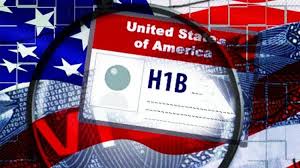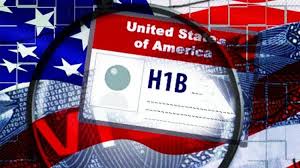
The Fraud Detection and National Security Directorate (FDNS) of the United States had created email addresses to receive information about suspected H-1B and H-2B fraud or abuse following the executive order last year signed and issued by President Donald Trump for his “Buy American, Hire American” policy.
That e-mail has received over 5,000 complaints related to fraud and abuse of H-1B visa according to media reports.
“As of May 21, 2018, the USCIS has received over 5,000 tips to the dedicated H-1B email address,” Philip Smith, a Spokesperson for the US Citizenship and Immigration Services (USCIS) told the media.
FDNS leads USCIS’s efforts to combat immigration benefit fraud.
Smith said that tips, alleged violations, and other related information concerning possible fraud or abuse of H-1B or H-2B can be submitted at the e-mail addresses by anyone – including American workers as well as those workers who suspect that they have been victimized by wrongful use of the visa.
However, no details were mentioned about the nature of the complaints, the companies who that were allegedly involved and the countries whose residents had been victims of H-1B visa fraud and abuse were not provided by the USCIS.
“Pursuant to the Buy American, Hire American Executive Order, FDNS has helped the agency investigate the H-1B program to protect American workers,” Smith said.
He said that as a measure to better the integrity of the immigration benefit process, the USCIS FDNS developed the Targeted Site Visit and Verification Program (TSVVP) in April 2017.
“This targeted approach focuses on H-1B dependent employers (those who have a high ratio of H-1B workers as compared to US workers, as defined by statute); Cases that we cannot validate the employer’s basic business information through commercially available data; and employers petitioning for H-1B workers who work off-site at another company or organization’s location,” Smith said in response to a question.
Checking of information and conducting background checks and addressing other concerns while the processing of immigration benefit applications and petitions are underway is done by FDNS.
This often requires the officials of the agency to get in touch with law enforcement or intelligence agencies so that they can be sure about the information that is relevant for the application or the petitioner whose case is being processed and whether such information can have any impact opn the eligibility of the benefit.
USCIS databases and public information are also checked by FDNS officers in addition to other administrative inquiries in order to confirm the information that is provided to support the applications and petitions.
At a time when there is a shortage of qualified workers ion the U.S., highly skilled foreign nationals are recruited by U.S. companies with the help of H-1B visas according to the USCIS.
“Yet, too many American workers who are as qualified, willing, and deserving to work in these fields have been ignored or unfairly disadvantaged,” the USCIS says on its webpage.
It said that wages and opportunities for requisite U.S. workers could be wrongfully forfeited by employers with the help of the H-1B visa program.
the H-1B visa is normally issued for three years and renewed for another three years and is very popular among Indian technology professionals.
The US Congress has a cap of 65,000 H-1B visas per year.
An additional 20,000 H-1B visas are also issued by the U.S. for recruitment of foreigners who possess masters and higher education from a US academic institute.
(Source:www.pti.com)
That e-mail has received over 5,000 complaints related to fraud and abuse of H-1B visa according to media reports.
“As of May 21, 2018, the USCIS has received over 5,000 tips to the dedicated H-1B email address,” Philip Smith, a Spokesperson for the US Citizenship and Immigration Services (USCIS) told the media.
FDNS leads USCIS’s efforts to combat immigration benefit fraud.
Smith said that tips, alleged violations, and other related information concerning possible fraud or abuse of H-1B or H-2B can be submitted at the e-mail addresses by anyone – including American workers as well as those workers who suspect that they have been victimized by wrongful use of the visa.
However, no details were mentioned about the nature of the complaints, the companies who that were allegedly involved and the countries whose residents had been victims of H-1B visa fraud and abuse were not provided by the USCIS.
“Pursuant to the Buy American, Hire American Executive Order, FDNS has helped the agency investigate the H-1B program to protect American workers,” Smith said.
He said that as a measure to better the integrity of the immigration benefit process, the USCIS FDNS developed the Targeted Site Visit and Verification Program (TSVVP) in April 2017.
“This targeted approach focuses on H-1B dependent employers (those who have a high ratio of H-1B workers as compared to US workers, as defined by statute); Cases that we cannot validate the employer’s basic business information through commercially available data; and employers petitioning for H-1B workers who work off-site at another company or organization’s location,” Smith said in response to a question.
Checking of information and conducting background checks and addressing other concerns while the processing of immigration benefit applications and petitions are underway is done by FDNS.
This often requires the officials of the agency to get in touch with law enforcement or intelligence agencies so that they can be sure about the information that is relevant for the application or the petitioner whose case is being processed and whether such information can have any impact opn the eligibility of the benefit.
USCIS databases and public information are also checked by FDNS officers in addition to other administrative inquiries in order to confirm the information that is provided to support the applications and petitions.
At a time when there is a shortage of qualified workers ion the U.S., highly skilled foreign nationals are recruited by U.S. companies with the help of H-1B visas according to the USCIS.
“Yet, too many American workers who are as qualified, willing, and deserving to work in these fields have been ignored or unfairly disadvantaged,” the USCIS says on its webpage.
It said that wages and opportunities for requisite U.S. workers could be wrongfully forfeited by employers with the help of the H-1B visa program.
the H-1B visa is normally issued for three years and renewed for another three years and is very popular among Indian technology professionals.
The US Congress has a cap of 65,000 H-1B visas per year.
An additional 20,000 H-1B visas are also issued by the U.S. for recruitment of foreigners who possess masters and higher education from a US academic institute.
(Source:www.pti.com)





